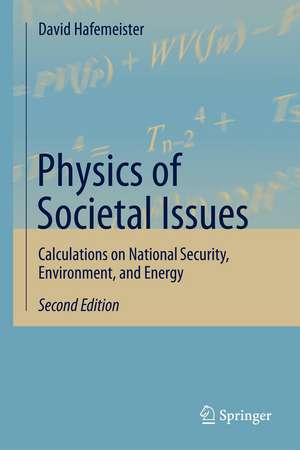Physics of Societal Issues: Calculations on National Security, Environment, and Energy
Autor David Hafemeisteren Limba Engleză Hardback – 7 dec 2013
• National Security: Weapons, Offense, Defense, Verification, Nuclear Proliferation, Terrorism
• Environment: Air/Water, Nuclear, Climate Change, EM Fields/Epidemiology
• Energy: Current Energy Situation, Buildings, Solar Buildings, Renewable Energy, Enhanced End-Use Efficiency, Transportation, Economics
Praise for the first edition:
"This insight is needed in Congress and the Executive Branch. Hafemeister, a former Congressional fellow with wide Washington experience, has written a book for physicists, chemists and engineers who want to learn science and policy on weapons, energy, and the environment. Scientists who want to make a difference will want this book."
Richard Scribner, first Director, Congressional Science and
Engineering Fellow Program, AAAS
"Hafemeister shows how much one can understand about nuclear weapons and missile issues through simple back-of-the-envelope calculations. He also provides compact explanations of the partially successful attempts that have been made over the past 60 years to control these weapons of mass destruction. Hopefully, Physics of Societal Issues will help interest a new generation of physicists in continuing this work."
Frank von Hippel, Professor, Princeton, former Assistant Director,
National Security, White House, OSTP
"Energy policy must be quantitative. People who don't calculate economic tradeoffs often champion simplistic hardware.‘The solution is more... nuclear power, or electric cars, or photovoltaics, etc.’ Some simple physics will show that the true solution matches supply and demand as an ‘integrated resource plan.’ Physics of Societal Issues is a good place to begin this journey."
Arthur Rosenfeld, former California Energy Commissioner,
Professor-emeritus, U. of California-Berkeley
| Toate formatele și edițiile | Preț | Express |
|---|---|---|
| Paperback (2) | 410.66 lei 6-8 săpt. | |
| Springer – 17 sep 2016 | 410.66 lei 6-8 săpt. | |
| Springer – 29 oct 2010 | 899.35 lei 6-8 săpt. | |
| Hardback (1) | 418.55 lei 6-8 săpt. | |
| Springer – 7 dec 2013 | 418.55 lei 6-8 săpt. |
Preț: 418.55 lei
Nou
Puncte Express: 628
Preț estimativ în valută:
80.09€ • 83.83$ • 66.66£
80.09€ • 83.83$ • 66.66£
Carte tipărită la comandă
Livrare economică 01-15 aprilie
Preluare comenzi: 021 569.72.76
Specificații
ISBN-13: 9781461492719
ISBN-10: 1461492718
Pagini: 576
Ilustrații: XX, 668 p. 109 illus., 38 illus. in color.
Dimensiuni: 155 x 235 x 43 mm
Greutate: 1.13 kg
Ediția:2nd ed. 2014
Editura: Springer
Colecția Springer
Locul publicării:New York, NY, United States
ISBN-10: 1461492718
Pagini: 576
Ilustrații: XX, 668 p. 109 illus., 38 illus. in color.
Dimensiuni: 155 x 235 x 43 mm
Greutate: 1.13 kg
Ediția:2nd ed. 2014
Editura: Springer
Colecția Springer
Locul publicării:New York, NY, United States
Public țintă
Upper undergraduateCuprins
Nuclear Weapons.- The Offense: Missiles and War Games.- The Defense: ABM/SDI/BMD/NMD.- Verification and Arms Control Treaties.- Nuclear Proliferation and Terrorism.- Air and Water Pollution.- Nuclear Pollution.- Climate Change.- Electromagnetic Fields and Epidemiology.- The Energy Situation and Fossil Fuels.- Energy in Buildings.- Solar Buildings.- Renewable Energy.- Enhanced End-Use Efficiency.- Transportation.- Energy Economics.- Appendix A: Nuclear Arms Chronology.- Appendix B: Energy/ Environment Chronology.- Appendix C: Nuclear-Age History.- Appendix D: Units.- Appendix E: Websites.- Appendix F: Symbols.- Appendix G: Glossary.- Appendix H: Index.
Notă biografică
David Hafemeister is Professor Emeritus of Physics at California Polytechnic State University, and Science Affiliate at the Center For International Security and Cooperation, Stanford University. He has also had an impressive career in Washington, D.C., as a Professional Staff Member:
Senate Committees on Foreign Relations and Governmental Affairs (1990-93 on arms control treaties at the end of the Cold War)
Science Advisor to Senator John Glenn (19775-77)
Special Assistant to Under Secretary of State Benson and Deputy Under-Secretary Nye (1977-78)
Visiting Scientist in the State Department’s Office of Nuclear Proliferation Policy (1979)
Office of Strategic Nuclear Policy (1987)
Study Director at the National Academy of Sciences (2000-02)
He has edited nine books, published more than 140 articles, and was awarded the APS Szilard award in 1996.
Senate Committees on Foreign Relations and Governmental Affairs (1990-93 on arms control treaties at the end of the Cold War)
Science Advisor to Senator John Glenn (19775-77)
Special Assistant to Under Secretary of State Benson and Deputy Under-Secretary Nye (1977-78)
Visiting Scientist in the State Department’s Office of Nuclear Proliferation Policy (1979)
Office of Strategic Nuclear Policy (1987)
Study Director at the National Academy of Sciences (2000-02)
He has edited nine books, published more than 140 articles, and was awarded the APS Szilard award in 1996.
Textul de pe ultima copertă
This book provides the reader with essential tools needed to analyze complex societal issues and demonstrates the transition from physics to modern-day laws and treaties. This second edition features new equation-oriented material and extensive data sets drawing upon current information from experts in their fields. Problems to challenge the reader and extend discussion are presented on three timely
issues:
• National Security: Weapons, Offense, Defense, Verification, Nuclear Proliferation, Terrorism
• Environment: Air/Water, Nuclear, Climate Change, EM Fields/Epidemiology
• Energy: Current Energy Situation, Buildings, Solar Buildings, Renewable Energy, Enhanced End-Use Efficiency, Transportation, Economics
Praise for the first edition:
"This insight is needed in Congress and the Executive Branch. Hafemeister, a former Congressional fellow with wide Washington experience, has written a book for physicists, chemists and engineers who want to learn science and policy on weapons, energy, and the environment. Scientists who want to make a difference will want this book."
Richard Scribner, firstDirector, Congressional Science and
Engineering Fellow Program, AAAS
"Hafemeister shows how much one can understand about nuclear weapons and missile issues through simple back-of-the-envelope calculations. He also provides compact explanations of the partially successful attempts that have been made over the past 60 years to control these weapons of mass destruction. Hopefully, Physics of Societal Issues will help interest a new generation of physicists in continuing this work."
Frank von Hippel, Professor, Princeton, former Assistant Director,
National Security, White House, OSTP
"Energy policy must be quantitative. People who don't calculate economic tradeoffs often champion simplistic hardware. ‘The solution is more... nuclear power, or electric cars, or photovoltaics, etc.’ Some simple physics will show that the true solution matches supply and demand as an ‘integrated resource plan.’ Physics of Societal Issues is a good place to begin this journey."
Arthur Rosenfeld, former California Energy Commissioner,
Professor-emeritus, U. of California-Berkeley
issues:
• National Security: Weapons, Offense, Defense, Verification, Nuclear Proliferation, Terrorism
• Environment: Air/Water, Nuclear, Climate Change, EM Fields/Epidemiology
• Energy: Current Energy Situation, Buildings, Solar Buildings, Renewable Energy, Enhanced End-Use Efficiency, Transportation, Economics
Praise for the first edition:
"This insight is needed in Congress and the Executive Branch. Hafemeister, a former Congressional fellow with wide Washington experience, has written a book for physicists, chemists and engineers who want to learn science and policy on weapons, energy, and the environment. Scientists who want to make a difference will want this book."
Richard Scribner, firstDirector, Congressional Science and
Engineering Fellow Program, AAAS
"Hafemeister shows how much one can understand about nuclear weapons and missile issues through simple back-of-the-envelope calculations. He also provides compact explanations of the partially successful attempts that have been made over the past 60 years to control these weapons of mass destruction. Hopefully, Physics of Societal Issues will help interest a new generation of physicists in continuing this work."
Frank von Hippel, Professor, Princeton, former Assistant Director,
National Security, White House, OSTP
"Energy policy must be quantitative. People who don't calculate economic tradeoffs often champion simplistic hardware. ‘The solution is more... nuclear power, or electric cars, or photovoltaics, etc.’ Some simple physics will show that the true solution matches supply and demand as an ‘integrated resource plan.’ Physics of Societal Issues is a good place to begin this journey."
Arthur Rosenfeld, former California Energy Commissioner,
Professor-emeritus, U. of California-Berkeley
Caracteristici
Provides the reader with essential tools needed to analyze complex societal issues using insights gained from informed estimates and calculations Demonstrates the transition from physics to laws and treaties focusing on timely issues that include national security, environment, and energy Includes numerous problems to challenge readers and extend discussion Contains new material, updated information, and advanced data sets from recent Conference Proceedings













